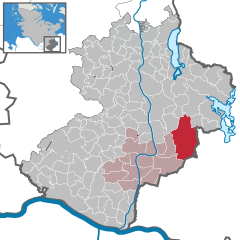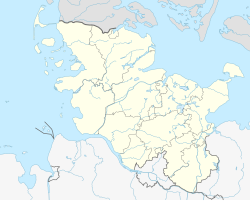
The Kiel Canal is a 98-kilometre-long (61 mi) freshwater canal in the German state of Schleswig-Holstein. The canal was finished in 1895, but later widened, and links the North Sea at Brunsbüttel to the Baltic Sea at Kiel-Holtenau. An average of 250 nautical miles (460 km) is saved by using the Kiel Canal instead of going around the Jutland Peninsula. This not only saves time but also avoids storm-prone seas and having to pass through the Danish straits.

Lauenburg, or Lauenburg an der Elbe (Lauenburg/Elbe), is a town in the state of Schleswig-Holstein, Germany. It is situated on the northern bank of the river Elbe, east of Hamburg. It is the southernmost town of Schleswig-Holstein and belongs to the Kreis (district) of Herzogtum Lauenburg. Lauenburg had a recorded population on 31 December 2013 of 11,253.

Holstein is the region between the rivers Elbe and Eider. It is the southern half of Schleswig-Holstein, the northernmost state of Germany.

The Federal Republic of Germany, as a federal state, consists of sixteen partly sovereign federated states. Since the German nation state was formed from an earlier collection of several states, it has a federal constitution, and the constituent states retain a measure of sovereignty.

The South Schleswig Voters' Association is a regionalist political party in Schleswig-Holstein in northern Germany. The party represents the Danish and Frisian minorities of the state.

The Bay of Kiel or Kiel Bay is a bay in the southwestern Baltic Sea, off the shores of Schleswig-Holstein in Germany and the islands of Denmark. It is connected with the Bay of Mecklenburg in the east, the Little Belt in the northwest, and the Great Belt in the North.
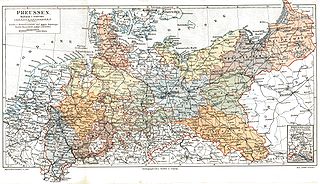
The Provinces of Prussia were the main administrative divisions of Prussia from 1815 to 1946. Prussia's province system was introduced in the Stein-Hardenberg Reforms in 1815, and were mostly organized from duchies and historical regions. Provinces were divided into several Regierungsbezirke, sub-divided into Kreise (districts), and then into Gemeinden (townships) at the lowest-level. Provinces constituted the highest level of administration in the Kingdom of Prussia and Free State of Prussia until 1933, when Nazi Germany established de facto direct rule over provincial politics, and were formally abolished in 1946 following World War II. The Prussian provinces became the basis for many federal states of Germany, and the states of Brandenburg, Lower Saxony, and Schleswig-Holstein are direct successors of provinces.
Elections in Germany include elections to the Bundestag, the Landtags of the various states, and local elections.
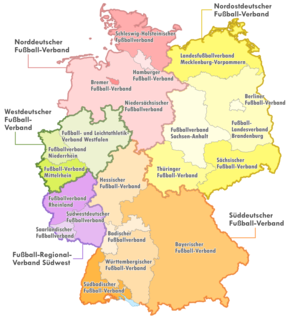
The Oberliga is currently the name of the fifth tier of the German football league system. Before the introduction of the 3. Liga in 2008, it was the fourth tier. At the end of the 2011–12 season the number of Oberligas was increased from eleven to fourteen.

The Regionalliga is the fourth tier in the German football league system. Until 1974, it was the second tier in Germany. In 1994, it was introduced as the third tier. Upon the creation of the new nationwide 3. Liga in 2008, it became the fourth tier.
The German football league system, or league pyramid, refers to the hierarchically interconnected league system for association football in Germany that in the 2016–17 season consists of 2,235 leagues in up to 13 levels having 31,645 teams, in which all divisions are bound together by the principle of promotion and relegation. The top three professional levels contain one division each. Below this, the semi-professional and amateur levels have progressively more parallel divisions, which each cover progressively smaller geographic areas. Teams that finish at the top of their division at the end of each season can rise higher in the pyramid, while those that finish at the bottom find themselves sinking further down. Therefore, in theory, it is possible for even the lowest local amateur club to rise to the top of the system and become German football champions one day. The number of teams promoted and relegated between the divisions varies, and promotion to the upper levels of the pyramid is usually contingent on meeting additional criteria, especially concerning appropriate facilities and finances.
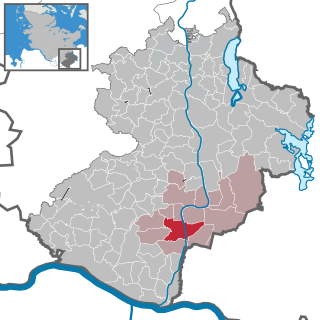
Büchen is a municipality in the district of Lauenburg, in Schleswig-Holstein, Germany. It is seat of the Amt Büchen.
Gudow-Sterley is a former Amt in the district of Lauenburg, in Schleswig-Holstein, Germany. It is situated approximately 16 km south of Ratzeburg, and 35 km south of Lübeck. Its seat was in Gudow.

The Free State of Prussia was a state of Germany from 1918 to 1947. It was established in 1918 following the German Revolution, abolishing the German Empire and founding the Weimar Republic in the aftermath of the First World War. The new state was a direct successor to the Kingdom of Prussia, but featured a democratic, republican government and smaller area based on territorial changes after the war. Despite bearing the brunt of Germany's territorial losses in Europe, Prussia remained the dominant state of Germany, comprising almost 5⁄8 (62.5%) of the country's territory and population, and home to the federal capital, Berlin. Prussia changed from the authoritarian state it had been under previous rulers to a democratic bastion within the Weimar Republic where democratic parties combined to win comfortable majorities in every free and fair election held.
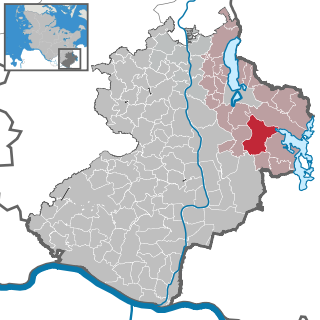
Sterley is a municipality in the district of Lauenburg, in Schleswig-Holstein, Germany.

Nienstedten is a quarter in the city of Hamburg, Germany. It belongs to the Altona borough on the right bank of the Elbe river. Nienstedten is home to the International Tribunal for the Law of the Sea. In 2016 the population was 7,238.

The old states of Germany are the ten states of the Federal Republic of Germany (FRG) that unified with the former German Democratic Republic (GDR) with its re-established 5 states upon German reunification on October 3, 1990.
The Verbandspokal is a regional men's association football competition in Germany. There are 21 Verbandspokal competitions which function as qualifying tournaments for the following season's DFB-Pokal, the premier German Cup competition. Bundesliga and 2. Bundesliga clubs are not permitted to enter as they are already directly qualified for the first round of the DFB-Pokal. While no Verbandspokal winner has ever gone on to win the German Cup, two have reached the final. Hertha BSC Amateure won the Berlin Cup in 1992 and went on to lose the 1992–93 DFB-Pokal final against Bayer 04 Leverkusen and FC Energie Cottbus won the 1996 Brandenburg Cup and went on to lose the 1996–97 DFB-Pokal final against VfB Stuttgart.
The Kreuz Hamburg-Ost is a basketweave interchange with two semi-direct links in the German states Schleswig-Holstein and Hamburg.

Patrick Breyer is a German digital rights activist, jurist, Pirate Party Germany politician, and – since 2019 – Member of the European Parliament (MEP). From 2012 to 2017 he was a member of the state parliament of Schleswig-Holstein and from April 2016 until the end of the legislative period he was also the leader of the Pirate group in that assembly. Breyer is one of four European Pirate Party MEPs in the 2019–2024 term along with three Czech Pirate Party members, all of whom are members of the Greens / EFA parliamentary group.
